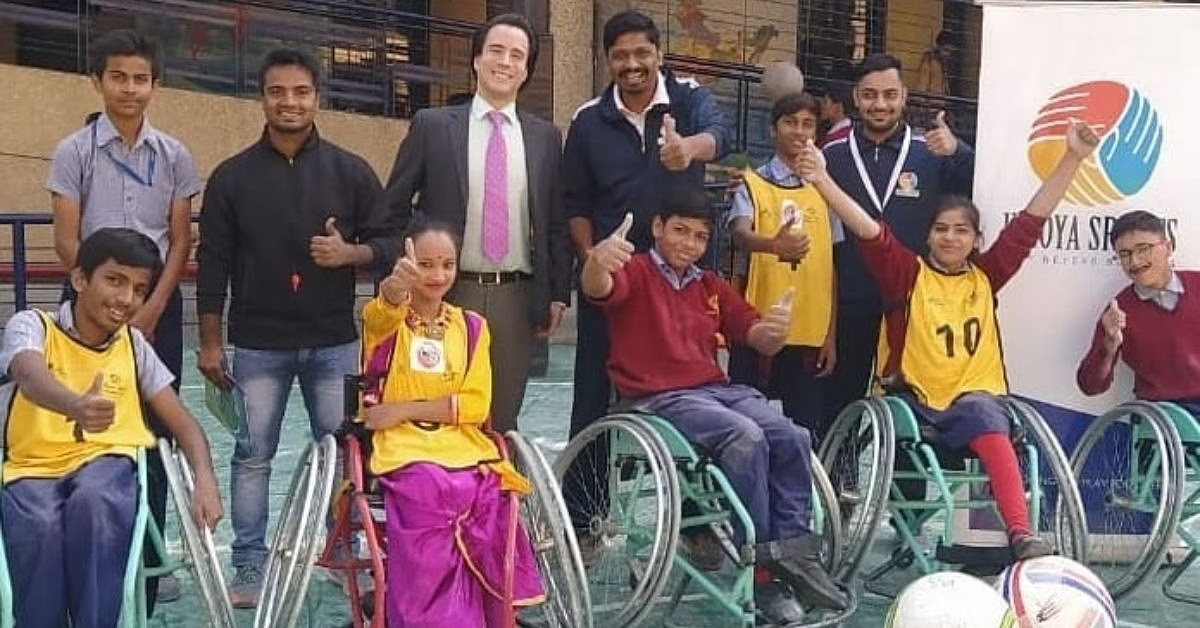
‘It’s Their Right to Play’: Teacher Uses Sports to Empower 12000 Kids with Disabilities
When Aditya KV was a Teach for India fellow in New Delhi, he had four disabled students in his class who were often left out of games or sports. On top of that, they were being picked on by the other kids as well. Naturally, this affected them emotionally, socially and academically. A passionate sportsperson who believes his time on the football field and basketball court taught him invaluable life skills, Aditya decided to use sports to help these students. He began a football programme for his class and by the end of the year, he saw a significant improvement in the attitudes of all the children, not just those four students.
“The other kids became more open and friendly with these kids. Sports created an environment of inclusion,” he recollects. That experience opened Aditya’s eyes to the obstacles disabled kids faced in Delhi NCR and how sports could help them. So, he decided to leave his corporate career behind and dedicate himself to making changes on a larger scale. In 2017, he founded Umoya Sports to empower one million students with and without disabilities. He chose the name ‘Umoya’, which is a Zulu word that means ‘spirit’, to serve as a guidepost for the organisation. The Umoya team identified three challenges faced specifically by Children with Disabilities (CwD) that they wanted to address: - A lack of quality in-school programmes that provide holistic development to students with disabilities; - A lack of social skills development and social integration of CwD because of social stigmas and misconceptions about disabilities; and - The physical and mental health issues faced by CwD as a result of frequently being excluded from sports/physical education in schools and the community.
The first part of Umoya’s strategy to tackle these problems involved creating year-long programmes that build a child’s fundamental movement and play and also teach them foundational sports skills. “We assess the child, understand the existing skill sets, strengths, and areas of improvement, and then we customise the programme activities so that the activity is skill appropriate and relevant for the child,” Aditya says. They also make modifications to their existing programmes for those with disabilities, under the educational programme known as ‘Adapted Physical Education’.
One of their students in the Adapted Physical Education programme is Mupu, a young girl with autism, who joined a few months ago. “The two long years of COVID threw most of the kids into inactivity, including my daughter,” her father Mahesh Kumar says. “When we heard about Umoya and its plan of individualised and group sports for kids with special needs, we were keen to go and check about the plan and structure they would put forth in helping my kid learn and benefit from sports.” In Mupu’s case, the teachers observed that she wasn’t comfortable handling a ball, so they created fun activities where all she had to do was hold the ball and run or throw it. In this way, they built up her confidence with a ball and now she even plays basketball and volleyball. “I love bringing Mupu to Umoya,” her mother Poonam Jha says.
“I am a big fan of their approach to building on the individual skills of a particular game gradually. In the last two months, this has made Mupu more confident in those skills.” According to Mupu’s parents, as a direct result of Umoya’s programme, their daughter has become more energetic and more confident, which means she is more open to tackling new challenges. Her communication has also improved, and she is using more words and sentences. “Previously it was mostly her and me, especially during the lockdown,” Jha says.
“Now I can sit and relax while she learns from the Umoya team. At home also she has started following our instructions more sincerely.” For Jayanti, whose son Neil Moshahari is also autistic, the patience Umoya’s team has with the children and their focus on the overall development of the child is what she appreciates the most. “I was looking for an overall sports activity but couldn’t get one till Umoya’s programme,” she says. “Neil’s transitions are better, and he is happier to come for his classes. He has made some connections with his peer group and I must appreciate the effort every member takes to build a rapport.” Umoya’s programmes have also changed her relationship with her son. “It has definitely made us both more patient,” she says.
“Umoya has helped me see my kid beyond therapies.” According to Aditya, Umoya assesses the progress of the children, and thereby the success of its programmes, using three parameters: - Developmental skills of motor coordination, agility, cardiovascular strength, and flexibility; - Ball skills of shooting and ball control; and - Social skills of confidence, teamwork, and patience. “For us, the success of the programme is not to make Tendulkars and Ronaldos but rather to build an opportunity for children with disabilities to experience sports, build life skills, become confident, and lead an independent and enriching life,” Aditya says.
The second part of Umoya’s strategy is partnering with sports brands and corporates to create inclusive sports events that bring together those with and without disabilities. One example of this is the Sportability Academy at Modern School in New Delhi. Umoya is the knowledge consultant for the Academy and is designing its sports programmes for children with special needs. Since it was founded five years ago, Umoya has reached over 12,000 children directly or indirectly and has recently launched pilot programmes in Mumbai and Bengaluru.
“Our ultimate goal is to witness a day where every child, disregarding their (dis)ability, gender, religion, socio-economic background, has equal access to Right to Play,” Aditya says.
